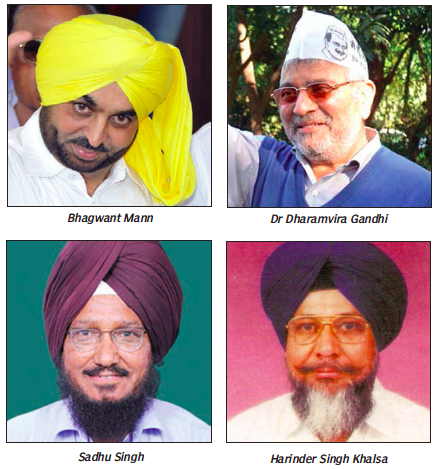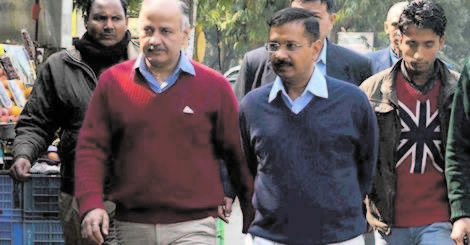
NEW DELHI (TIP): Arvind Kejriwal is a social activist and politician. He is the CM designate of Delhi as his party AAP won 67 of the 70 assembly seats of Delhi. He launched the Aam Aadmi Party (AAP) in 2012. A former Indian Revenue Service officer, he is better known for his key role in drafting the Jan Lokpal Bill.
In 1999, Kejriwal founded Parivartan, an NGO aiming to assist the citizens in electricity, income tax and food ration-related matters. He won the 2006 Ramson Magsaysay Award for Emergent Leadership for his contribution to empower the poorest at the grassroots level and implement the Right to Information Act (RTI). He created a corpus fund with the award money and founded the NGO ‘Public Cause Research Foundation’ in 2006.
Kejriwal also published a book called Swaraj in 2012. Arvind Kejriwal was sworn in as Delhi Chief Minister for the first time on 28 December 2013 at the Ramlila Maidan and formed the government with Congress’s support. However, his tenure lasted for only 49 days as he decided to resign from his post after both BJP and Congress turned adamant and put their foot down against giving clearance to Aam Aadmi Party’s Jan Lokpal Bill.
Personal background
Arvind Kejriwal was born on 16 August 1968 in Bhiwani, Haryana, to a well-educated couple, Gobind Ram Kejriwal and Gita Devi. Arvind Kejriwal has a younger brother and a younger sister. His father, Gobind Ran Kejriwal, was an electrical engineer from the Birla Institute of Technology, Mesra. His father’s work related transfers led him to several different places. Consequently, Arvind Kejriwal had to spend his childhood mostly in towns like Ghaziabad, Hisar and Sonepat. He studied at the Campus School in Hisar. Arvind Kejriwal graduated in mechanical engineering from the Indian Institute of Technology, Kharagpur, in 1989. He also spent some time at the Ramkrishna Mission and Nehru Yuva Kendra in Kolkata.
Kejriwal is married to Sunita, his batch mate from the National Academy of Administration, Mussoorie. She is an IRS officer. They have two children – a daughter, Harshita, and a son, Pulkit. Arvind Kejriwal is a pure vegetarian and has been a regular practitioner of Vipassana.
Professional background
After completing his studies in mechanical engineering from the Indian Institute of Technology, Kharagpur, he joined Tata Steel. He took leave of absence from the company so that he could concentrate on the Civil Services examination. In 1992 he quit his job. In the same year he cleared the Civil Services examination and joined the Indian Revenue Service. In February 2006, he resigned from the post of Joint Commissioner in the Income Tax Department. While working with the Income Tax department, he assisted in forming the NGO Parivartan in December 1999.
How did Arvind Kejriwal joined politics?
During the nation-wide protests against corruption, Arvind Kejriwal had a difference of opinion with social activist Anna Hazare. Hazare wanted the Jan Lokpal movement to be politically neutral. On the other hand, Kejriwal’s opinion was that as no progress had been attained through talks with different political parties, it was necessary to get directly involved in politics. An organisation named India Against Corruption conducted a survey in this regard. The result indicated support for politicisation. Others involved in the anti-corruption movement too had split opinions. While Kejriwal’s move was supported by Shanti Bhushan and Prashant Bhushan, others like Santosh Hegde and Kiran Bedi opposed it.
On 19 September 2012, Anna Hazare and Arvind Kejriwal found that their differences over formation of a political party to replace India against Corruption movement were irreconcilable. On 2 October 2012, the birth anniversary of Mahatma Gandhi, Kejriwal announced the formation of a political party. He mentioned that the party would be formally launched on 26 November 2012. The Constitution of India was adopted on this day in 1949.
The party was launched in Delhi on the scheduled date and was called the Aam Aadmi Party (AAP) or the Common Man’s Party. The party contested elections for the first time on 4 December 2013 for the Delhi legislative assembly. Arvind Kejriwal defeated Sheila Dikshit in the New Delhi assembly constituency, who had been the chief minister of Delhi for three successive terms. He was first sworn in as the Chief Minister on 28 Dec 2013. He governed Delhi for only 49 days as he resigned from the post in Feb 2014.
Strategy for 2014 General Elections
After Arvind Kejriwal’s resignation from the CM’s post in February, the AAP set its sights on the Lok Sabha polls. A month earlier than stepping down, Kejriwal had said that he would not contest the Parliamentary Elections. He later contested from the Varanasi parliamentary constituency in Uttar Pradesh against BJP’s Prime Ministerial candidate Narendra Modi, alleging that the party members insisted him to do so. Kejriwal lost the elections with a margin of around four lakh votes.
Arvind Kejriwal led AAP’s run up to the 2015 Delhi Assembly Elections After 9 months of Governor’s Rule in Delhi, the Elections Commission of India dissolved the Delhi Legislative Assembly. This meant that Delhi had a date with fresh elections. Arvind Kejriwal led Aam Aadmi Party (AAP) started making a strategy for the elections. Initially, the party released a list of 62 candidates for the elections. It later added eight other names. Thus the party fielded its candidates in all 70 constituencies of Delhi as compared to 69 in the 2013 elections. AAP has resorted to innovative ways of raising funds for campaigning such as offering lunch and dinner with Kejriwal via subscriptions. The party also received funds online from the public. Social media sites too helped Kejriwal gain popularity among the masses.
Historic Win in Delhi for AAP and Arvind Kejriwal’s Re-election as the Chief Minister
The National Capital Territory of Delhi went to polls on 7 February 2015 and saw a record electorate turnout of 67.14 percent. But the history was still to be made. Three days later, on 10 February 2015, the “Broom” of AAP swept the Delhi polls. The AAP registered a slam-bang victory by grabbing 67 seats of the available 70. The favourite BJP was compressed to be restricted to as minimal as three seats, while Congress and the rest were crushed to ashes, accounting for none. The chief and the CM candidate of AAP, Arvind Kejriwal himself won from the New Delhi assembly constituency with a margin of more than twenty six thousand votes. He defeated the debutant Nupur Sharma of BJP and veteran Congress leader Kiran Walia. Kejriwal decided to take oath as the Chief Minister of Delhi on 14 February 2015 (a year after he had resigned from the same post), at the famous Ramlila Ground in Delhi.
Achievements
- In 1999 Kejriwal helped in the foundation of Parivartan, an NGO aiming to assist the citizens in electricity, income tax and food ration-related matters.
- Played a key role to empower the poorest at the grass-root level and implement the Right of Information Act (RTI).
- Created a corpus fund with the award money he received from the Magsaysay Award, and with that founded the NGO called Public Cause Research Foundation in 2012.
- A committee constituted by the Government of India inducted Arvind Kejriwal as a representative member of the civil society to draft the Lokpal Bill.
- Participated in drafting the Jan Lokpal bill.
- Arvind Kejriwal became the architect of the movement that was started by Anna Hazare — the Jan Lokpal that demanded Citizen’s Ombudsman Bill.
- To fight corruption cases in government departments like Delhi Electricity Board, Income Tax Department, Municipal Corporation of Delhi and the likes, Kejriwal uses the Right To Information Act.
- Exposed alleged corruption and irregularities of political parties and government agencies through press conferences.





Be the first to comment